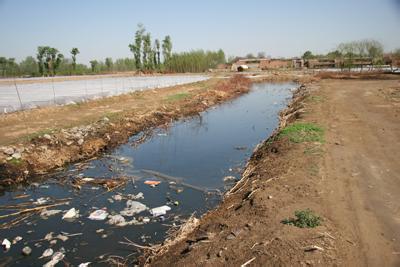Livestock industry a big source of pollution
 0 Comment(s)
0 Comment(s) Print
Print E-mail Xinhua, December 16, 2013
E-mail Xinhua, December 16, 2013
China's livestock industry has become a growing pollution and public health headache in some rural areas.
In Santang Township in Guangxi Zhuang Autonomous Region, farmers dump animal carcasses without any treatment, according to Liu, a local villager.
 |
|
China's livestock industry has become a growing pollution and public health headache in some rural areas. [File photo] |
"If there are many dead animals, we will dump the bodies in remote places away from rivers to prevent disease," Liu said, adding there are no decontamination facilities in Santang.
The Animal Epidemic Prevention Law states that farm animals which die of disease must be burned at appointed treatment stations. However, in many places such facilities are outmoded and unfit for the purpose.
Fang Huansen, head of animal health supervision in Ningming County of Guangxi, said carcasses thrown into ponds or rivers could pollute the water.
Disease-ridden carcasses dumped in reservoirs could lead to epidemics or transmit bacterial infections to both humans and other animals.
He Ruogang, professor of animal science and technology at Guangxi University, believes illegal dumping combined with a lack of supervision means diseased meat often makes it onto the market.
"Profits from meat sales are high, as are the costs of treating fallen stock,' He said. "So some greedy farmers sell the carcasses at very low prices to processors who then sell it on the market."
Guangxi is just a snapshot of a bigger picture.
In March, the rotting bodies of more than 10,000 pigs were found in a river that provides 22 percent of Shanghai's tap water, causing alarm across China, as well as international scorn.
A hog farm in Jiaxing City, Zhejiang Province, eventually confessed to dumping the dead pigs.
Animal waste is another source of pollution.
The problem is so serious that some villages have become known as "pig poop villages," Fang said.
Santang farmers pour animal waste into a pond, where villagers once washed clothes. The water has turned black and all the fish have died.
The poultry and cattle industries are just as bad, Fang added.
Jiang Yongqiang, an animal husbandry expert in Guangxi's Luchuan Township, believes the key to tackling pollution lies in educating farmers.
"It is necessary to promote environmental protection to let them know pollution will eventually cause them losses," said Jiang.






Go to Forum >>0 Comment(s)